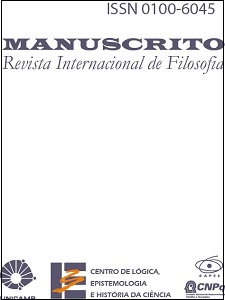Resumo
Francis Bacon foi considerado por alguns pensadores o pai do método experimental. Outros filósofos o acusaram de advogar um empirismo naif. Em nosso artigo pretendemos identificar as peculiaridades do tipo de empirismo abraçado por Bacon. Os mais duros críticos de Bacon têm destacado sua retórica fatualista e têm dispensado pouca atenção à complexidade de um sistema metodológico que atribui papel crucial à evidência negativa. Negligenciam principalmente o real significado epistemológico de sua proposta de uma indução eliminatória. Associando Bacon rigidamente a uma espécie de empirismo justificacionista deixam de detectar importantes ingredientes falibilistas em sua obra. Por aspirar a identificar o que pode haver de falibilismo na obra de Bacon este artigo questionará a avaliação que Popper faz de Bacon ao apresentá-lo como o grande representante do empirismo ingênuo e dogmático. Por mais que sejam procedentes algumas das críticas que Popper dirige a Bacon, mostraremos que sua leitura repete velhos clichês sobre o autor do Novum Organum.
Some philosophers regard Francis Bacon as the father of experimental method. Others accuse Bacon of defending a naïf empiricist theory of knowledge. In this article I try to identify the peculiarities of the empiricism supported by Bacon. Bacon’s most severe critics emphasize his factualist rhetoric, paying no sufficient attention to the complexity of a methodological system that attributes a crucial role to negative evidence. They neglect the real epistemological meaning of Bacon’s proposal of an eliminative induction. As a rule, such critics are unable to detect the important fallibilist features present in Bacon’s work because they tend to, uncritically, identify him with a kind of empiricist justificationism. The purpose of this article is to investigate the possible fallibilist elements in Bacon’s writings. By so doing, I shall challenge Popper’s evaluation of Bacon’s philosophy of science. I disagree with Popper when he describes Bacon as a dogmatic and naïf empiricist. Although some of the criticisms Popper addresses to Bacon are well-founded, I will argue that the general reconstruction of Bacon’s inductivism carried out by Popper is not fully defensible.

